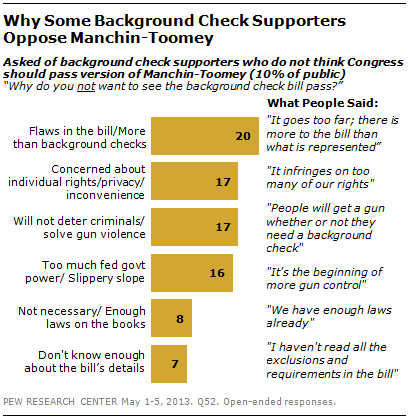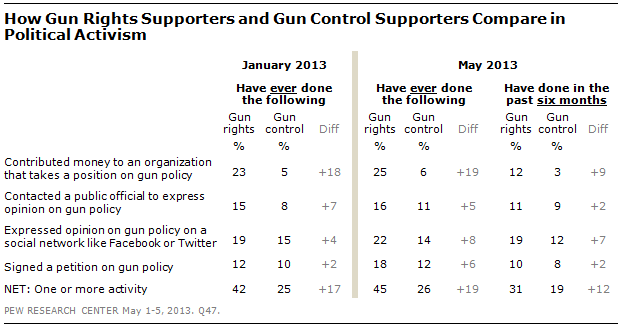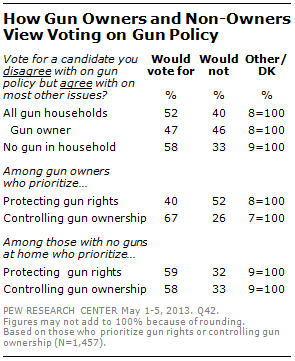Overview
Following the Senate’s rejection of gun legislation last month, the public continues to overwhelmingly favor making private gun sales and sales at gun shows subject to background checks.  Nearly three-quarters of Americans (73%) say that if the Senate bill is reintroduced, Congress should pass it.
Nearly three-quarters of Americans (73%) say that if the Senate bill is reintroduced, Congress should pass it.
However, even gun control advocates are pessimistic that new gun policy legislation will be enacted this year. Overall, 55% of the public – including 53% of those who favor controlling gun ownership – say it is unlikely that Congress will pass significant new gun control laws this year.
The national survey by the Pew Research Center, conducted May 1-5 among 1,504 adults, finds advantages and disadvantages for both sides in the debate over gun policy.
Gun control supporters can point to broad and consistent public support for expanded background checks. Fully 81% favor making private gun sales and sales at gun shows subject to background checks, little changed since January (85%). The proposal draws nearly equal levels of support from Democrats (83%), Republicans (81%) and independents (80%).
However, the Senate bill on background checks is far more divisive. Republicans are decidedly less supportive of this legislation than of the general idea of making private gun sales subject to background checks; 57% support the Senate bill, while 81% favor expanding background checks. Many of those who have reservations about the bill express concerns that it includes other restrictions beyond background checks, or that it opens a “slippery slope” toward more government power.
The survey finds that gun control supporters continue to lag gun rights advocates on most measures of political activism. However, nearly as many gun control supporters (9%) as opponents (11%) say that in the last six months they have contacted a public official to express their opinion on gun policy.
 Yet the overall trend on whether it is more important to control gun ownership or protect gun rights has edged back in the direction of gun rights. And when it comes to the importance of gun policy as a voting issue, gun rights supporters have the advantage.
Yet the overall trend on whether it is more important to control gun ownership or protect gun rights has edged back in the direction of gun rights. And when it comes to the importance of gun policy as a voting issue, gun rights supporters have the advantage.
In the days after the school shooting in Newtown, Conn. last December, more prioritized gun control than gun rights (49% vs. 42%), the first time this had occurred since Barack Obama became president. Roughly five months later, the public is again evenly divided over whether in general it is more important to control gun ownership (50%) or to protect the rights of Americans to own guns (48%). This mirrors the close divide in opinion that existed prior to Newtown. (See Pew Research Center’s 20 years of public opinion data on gun rights and gun control.)
 Among those who prioritize gun rights, 41% say they would not vote for a candidate with whom they disagreed on gun policy, even if they agreed with the candidate on most other issues. Fewer gun control supporters (31%) say gun policy is a make-or-break voting issue for them.
Among those who prioritize gun rights, 41% say they would not vote for a candidate with whom they disagreed on gun policy, even if they agreed with the candidate on most other issues. Fewer gun control supporters (31%) say gun policy is a make-or-break voting issue for them.
And while nearly as many gun control supporters as gun rights supporters report contacting a public official about gun policy in the past six months, more gun rights advocates have contributed money to organizations that take positions on gun policy (12% vs. 3% of gun control supporters).
 Meanwhile, overall impressions about the political influence of the National Rifle Association (NRA) are about the same today as they were in the days following the Connecticut tragedy. Currently, 39% think the NRA has too much influence over gun control laws in this country; about half (53%) say either that the NRA has the right amount of influence (35%) or that it has too little influence (18%) over gun control laws.
Meanwhile, overall impressions about the political influence of the National Rifle Association (NRA) are about the same today as they were in the days following the Connecticut tragedy. Currently, 39% think the NRA has too much influence over gun control laws in this country; about half (53%) say either that the NRA has the right amount of influence (35%) or that it has too little influence (18%) over gun control laws.
However, there is a wider gap in opinions about the NRA’s influence between liberal Democrats and conservative Republicans than in December. In the current survey, 77% of liberal Democrats say the NRA has too much influence over gun control laws, up from 59% in December. By contrast, more conservative Republicans say the NRA has the right amount of influence than did so in December (58% now, 46% then).
Background Checks vs. Background Checks Legislation
 A wide majority of Americans would like to see the Manchin-Toomey bill, which failed to garner sufficient votes in the Senate a few weeks ago, to ultimately succeed. Yet even at 73%, support for a new background checks bill falls short of the 81% who favor expanded background checks in general. Republicans – particularly conservatives and those who agree with the Tea Party – are most likely to see a distinction between the two.
A wide majority of Americans would like to see the Manchin-Toomey bill, which failed to garner sufficient votes in the Senate a few weeks ago, to ultimately succeed. Yet even at 73%, support for a new background checks bill falls short of the 81% who favor expanded background checks in general. Republicans – particularly conservatives and those who agree with the Tea Party – are most likely to see a distinction between the two.
Nearly eight-in-ten conservative Republicans (77%) favor background checks on private gun sales, but just 50% say they want Congress to pass new legislation along the same lines as the Manchin-Toomey bill.
The differences in support are even more dramatic among Republicans and Republican-leaning independents who agree with the Tea Party; 63% support making private gun sales subject to background checks, but fewer than half as many (28%) say Congress should pass the Senate bill to expand background checks, compared with 67% who say it should not.
There also is a 21-point difference in support among gun owners for background checks (82% favor) and the Senate background checks legislation (61%). Yet this is almost entirely driven by Republicans and GOP-leaning independents – 79% of Republican gun owners favor background checks, while 43% want this background checks legislation to pass. Among Democrats and Democratic leaners who own guns, 90% support background checks while 88% favor the Senate legislation.
 When those who support background checks in general but oppose the Senate legislation (10% of the public) are asked why they do not want to see the bill pass, 20% point to flaws in the legislation. Nearly as many cite worries about individual rights (17%) or say that it would expand government power too much (16%). Another 17% are critical of the legislation’s effectiveness, saying that it will not deter criminals or curb gun violence.
When those who support background checks in general but oppose the Senate legislation (10% of the public) are asked why they do not want to see the bill pass, 20% point to flaws in the legislation. Nearly as many cite worries about individual rights (17%) or say that it would expand government power too much (16%). Another 17% are critical of the legislation’s effectiveness, saying that it will not deter criminals or curb gun violence.
Polling on Background Checks: A Closer Look
 Since January, the Pew Research Center has asked its question on background checks three times. In the current survey, 81% favor making private gun sales and sales at gun shows subject to background checks. This is not significantly different from February (83%) and down only slightly from January (85%).
Since January, the Pew Research Center has asked its question on background checks three times. In the current survey, 81% favor making private gun sales and sales at gun shows subject to background checks. This is not significantly different from February (83%) and down only slightly from January (85%).
Other major surveys have also tracked the background checks issue with similarly lopsided results, though some suggest slippage of support for background checks. As many as 88% support a federal law requiring background checks on all potential gun buyers, according to an April 24-28 New York Times/CBS News survey, compared with 92% in January. And an April 22-25 Gallup survey found 83% saying they would vote for a law requiring background checks on all gun purchases, down from 91% when a similar question was asked in January.
Democrats Not Bullish about Gun Control Prospects
 There are only modest partisan differences in expectations for passage of significant gun control legislation this year. Fewer than half of Democrats (45%), independents (42%) and Republicans (41%) say it is very or somewhat likely that the president and Congress will pass new gun control legislation.
There are only modest partisan differences in expectations for passage of significant gun control legislation this year. Fewer than half of Democrats (45%), independents (42%) and Republicans (41%) say it is very or somewhat likely that the president and Congress will pass new gun control legislation.
However, better educated people are far more likely than those with less education to give negative assessments of gun control’s prospects. Just 27% of those with a post-graduate degree say that Congress is likely to pass gun control legislation this year; 72% say this is not too likely or not at all likely. Among those with a high school diploma or less, 52% see passage of gun control legislation as likely while 45% say it is unlikely.
Views of Gun Policy Proposals
 Overall, there has been little change since January in opinions about two other gun policy proposals: creating a federal database to track all gun sales and a ban on assault style weapons. Currently 66% support a federal gun database and 54% support an assault weapons ban.
Overall, there has been little change since January in opinions about two other gun policy proposals: creating a federal database to track all gun sales and a ban on assault style weapons. Currently 66% support a federal gun database and 54% support an assault weapons ban.
Support for more teachers and school officials having guns in school has declined, from 40% in January to 34% in the current survey. More than six-in-ten (63%) oppose this proposal.
 There are wide partisan differences over each of these proposals, in contrast to support for background checks. Substantial majorities of Democrats favor a federal gun sale database (80%) and a ban on assault-style weapons (68%); among Republicans, 48% and 39%, respectively, favor these proposals.
There are wide partisan differences over each of these proposals, in contrast to support for background checks. Substantial majorities of Democrats favor a federal gun sale database (80%) and a ban on assault-style weapons (68%); among Republicans, 48% and 39%, respectively, favor these proposals.
The Gun Policy Activism Gap
There is a substantial gap between those who prioritize gun rights and gun control when it comes to political involvement. Nowhere is this gap larger than in making donations to activist organizations. The current survey finds that a quarter (25%) of those who prioritize gun rights say they have, at some point, contributed money to an organization that takes a position on the issue, and about half of those (12% overall) have contributed money within the past six months. By comparison, just 6% of those who prioritize gun control have ever donated to a group, and only 3% have done so in the past six months.

The gap in overall political outreach is more modest: 16% of gun rights proponents say they have ever contacted a public official to express their opinion on gun policy, compared with 11% of gun control proponents. However, when asked about just the past six months, similar numbers of gun rights (11%) and gun control (9%) proponents say they have expressed their views on the issue to a public official.
Gun rights and gun control proponents have also been about equally likely to have signed a petition on gun policy over the past six months (10% vs. 8%, respectively). There has been a larger gap in discussing the issue on social media: 19% of those who prioritize gun rights say they have expressed their opinion on social networks like Facebook or Twitter, compared with 12% of those who prioritize gun control.
 Gun Policy as a Voting Issue
Gun Policy as a Voting Issue
Nearly half of conservative Republicans (47%) say they would not vote for a candidate who agreed with them on most issues, but disagreed with them on gun policy. Smaller percentages across other partisan and ideological groups, including 37% of liberal Democrats, say they would not support candidates who did not share their views on gun policy, even if they agreed with them on most other issues.
People who own guns (46%) are more likely than those in households with no guns (33%) to view gun policy as an important voting issue.  And among the vast majority of gun owners who support gun rights, 52% say they would not vote for a candidate with whom they disagreed on gun policy even if they agreed with them on most other issues. Among the much smaller share of gun owners who favor gun control, just 26% view gun policy as an important voting issue.
And among the vast majority of gun owners who support gun rights, 52% say they would not vote for a candidate with whom they disagreed on gun policy even if they agreed with them on most other issues. Among the much smaller share of gun owners who favor gun control, just 26% view gun policy as an important voting issue.
Among those in households with no guns, about as many who favor gun control (33%) as gun rights (32%) say they would not vote for a candidate who they disagreed with on gun policy but agreed with on most other issues.
Influence of the National Rifle Association
 While the NRA has played a highly visible role in the congressional debate over gun policy, public views of its influence have changed only modestly since December. Currently, about four-in-ten (39%) say it has too much influence over gun control laws, while 18% say it has too little influence and 35% say the organization has the right amount of influence.
While the NRA has played a highly visible role in the congressional debate over gun policy, public views of its influence have changed only modestly since December. Currently, about four-in-ten (39%) say it has too much influence over gun control laws, while 18% say it has too little influence and 35% say the organization has the right amount of influence.
Fully 77% of liberal Democrats say the NRA has too much influence over gun control laws, up 18 points since December and the highest percentage of any partisan group. By contrast, conservative Republicans are the only partisan group in which a majority (58%) says the NRA has the right amount of influence over gun laws.
A majority (61%) of those who prioritize controlling gun ownership think the NRA has too much influence. Among those who say it is more important to protect gun rights, 54% view the NRA’s influence as appropriate while 21% say the organization has too little influence.


